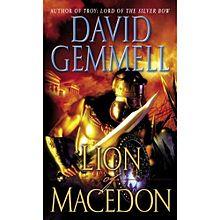 First edition | |
| Author | David Gemmell |
|---|---|
| Cover artist | Geoff Taylor |
| Country | United Kingdom |
| Language | English |
| Genre | Fantasy novel |
| Publisher | Legend Books |
Publication date | 1990 |
| Media type | Print (Hardback & Paperback) |
| Pages | 516 pp (paperback) |
| Followed by | Dark Prince |
Lion of Macedon is a historical fantasy novel by English author David Gemmell. First published in 1990, it and its 1991 sequel, Dark Prince, follow the career of a fictionalized version of the Macedonian general Parmenion.
The story is loosely based on historic events, but adds fantasy elements such as supernatural creatures and sorcery that become even more significant in the book's sequel, Dark Prince.
Plot summary
As the story opens, Tamis, a sorceress, is seeing the future. She discovers that only a mixed-blood Spartan called Parmenion can help her. Parmenion is a half-blood Spartan (a Mothax) whose mother is from Macedon. He is an accomplished runner and a strategic genius, yet he is despised by the young Spartan nobles for being a half-blood. He is forced to kill a love rival in duel and then flees to Thebes.
There, Parmenion starts a new life as a professional runner. Thebes is under the control of Sparta, governed by a puppet-government of pro–Spartan Thebans and occupied by a Spartan garrison. Parmenion becomes involved with Thebian conspirators who seek to overthrow Spartan control. Their revolt succeeds and the Spartans are expelled but it ultimately leads to an extended war between to the two city states, ending with Parmenion crushing the Spartan army, destroying the Spartan legend of invincibility in the process.
Some years later Parmenion is a famous mercenary general, winning battles all around Asia. He is then offered a chance to rebuild the Macedonian army of the young Philip II of Macedon. Philip, living in Thebes at the time of the Sparta's decisive defeat in the Battle of Leuctra, was inspired by Parmenion's strategic brilliance to develop his own, highly effective approach to tactics and armament. The book ends with the birth of Philip's son, Alexander the Great, who would go on to develop his father's theories to an entirely new level.